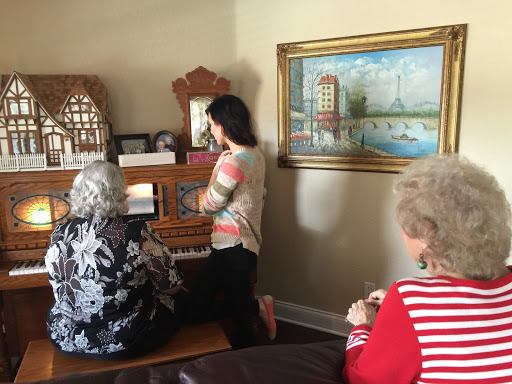Caring for someone living with dementia is unlike caring for any other diagnosis. Dementia care requires a holistic approach that treats the whole person, not just the dementia. This means focusing on mental, physical, and spiritual health. While this may sound like more work at an already confusing time, it is not. By thinking of the whole picture, the do’s and don’ts overlap to create a web of network and care that will benefit you both and decrease suffering.
To help you get started, here are some easy do’s and don’ts of dementia care.
Seven Easy Dementia Care Do’s

1. Do slow down.
Changes in complex attention can make multi-tasking more challenging. By limiting distractions you can help reduce confusion and frustration. This is good advice for both partners in care.
2. Do create a calm environment.
Think about all of the different stimuli in your home. Is there a TV on? How many objects give audio alerts (telephone, tablet, smartphone, doorbell, fridge or door alarms)? While it can be soothing to have one source of entertainment on, overlapping noise and alerts can pull us out of the moment and distract us causing confusion and frustration.
Make sure that the home environment is visually and audibly quiet and at a comfortable temperature. Remove visually confusing clutter and fabric patterns. The calmer the sensory input, the more you can reduce confusion and frustration.
3. Do support interdependence.

It is a good thing for your loved ones to do as much as they can and want for themselves. Look for ways to support your aging loved one while encouraging independence. These opportunities for them to support you and themselves will add to the feeling of connectedness and help stave off frustration from feeling useless. What you support them in doing will depend entirely on their desires and personality.
An example may be that they want to help with setting the table. Finding ways for them to help will let them feel good about themselves. Getting glassware and plates that don’t break can support this. They may want to help fold the laundry. Letting go of any desire for perfection can help this. They may want to mow the lawn, wash the car, and work. It is crucial to get creative rather than defaulting to “no you can’t do that anymore”. Work together to figure out what modifications can make this possible.
Doing for ourselves and others is core to dignity. For as long as your loved one is interested in participating in these little parts of life, everything you can do to support them will bring you both joy.
4. Do simplify things.

One of the common challenges in dementia care is to remember to simplify things. Speak in simple sentences and give simple instructions. Speak clearly and at a volume your loved one can hear. Remember that the easier speech is to understand, the easier it is to follow. Speak to your loved one as if he or she understands and always give them the benefit of the doubt.
When you communicate with someone living with dementia, receptive interpretation (understanding what we hear) and expressive language (saying what we mean) changes at different rates. This means that just because someone isn’t able to speak to you does not mean they do not understand when you speak. Conversely, it also means that someone who can communicate verbally clearly may have a hard time understanding a verbal response.
5. Do establish a familiar routine.
Dementia can make change more challenging. The more you can establish routines throughout day-to-day life, the more you both will know what to expect, and the smoother your days will run. To the extent possible, eat at the same time throughout the day and establish familiar bedtime routines. This will provide stability for your loved one.
With that being said, although it is super important to create these structures such as a regular schedule, it is important to also be ready to go with the flow and improvise with your loved one with dementia if they are moving at a different pace one day. If you can join them and follow where they lead you will both be much happier. This might mean eating breakfast food for dinner, wearing Christmas sweaters in June, or having a dance party in the middle of a store. Go with it, memories are being made.
6. Do respond to your loved one’s feelings.

Treat your loved one with love, dignity, and joy. Words may not match true feelings as expressive language changes. Try to read your loved one’s actions as well as their words to understand what they are feeling. Make space for all of the feelings, theirs, and yours – the easy and the hard.
The journey with dementia is a very rich time psychologically and spiritually. While there are marked physical declines, there can also be rich growth spiritually. Expressing and responding to both of your feelings is a way to tap into that opportunity. For example, if your loved one is moved to tears by a song or piece of art do not immediately try to cheer them up. Get curious about what moved them and support them.
The same goes for you. Caring for someone living with dementia is an emotional and spiritual journey. Be gentle with yourself and tend kindly to your own feelings and process.
1. Do be patient and flexible.
Caring for someone with dementia is like riding a wave, go with it. Be patient, kind, and flexible. Meet them where they are mentally and emotionally at any given moment. It will change constantly, and it is best to expect nothing else.
Eight Easy Dementia Care Don’ts

1. Don’t speak to the person as if he or she were a child.
Dementia does not mean your loved one should not be treated with dignity. Feelings are easily hurt, and misunderstandings may be frequent. Speaking to your loved one like they are a child will just add insult to injury.
Your loved one is not returning to childhood; they are entering a new and different life phase. This time may have childlike qualities but there is a depth to dementia and carrying forward of a life lived that is in stark contrast to childhood.
Where childhood prepares us for all of our potential adulthoods, dementia is a closing of a chapter, a tying up of loose ends, the processing of a life lived and integrating it. Sometimes integrating means losing what we called ‘ourselves’ piece by piece. Childhood is a building up, dementia is a winnowing down to an essence. While there are surface similarities they are not the same nor should they be treated as though they are.
2. Don’t scold your loved one or argue with them.
You may be very frustrated, but he or she is not intentionally making a mistake or trying to be disruptive.
3. Don’t speak to the person in negatives.
Try to be positive. It is better to say “Let’s look at this book” than “Stop picking up that glass.” Focus on what is present versus what is lost. You can easily refocus their attention on positive activities that pose no danger or risk to them.
4. Don’t live in the past.

Never say “Don’t you remember?” or “I just told you that five times.” Your loved one may not remember. He or she may not know you just told them something repeatedly. That time doesn’t exist for your loved one. The only time that does exist is the moment you are in, right now.
5. Don’t remove yourself emotionally.

Your loved one needs nurturing. You probably do too! Find ways to stay connected emotionally. Express how you are feeling, tell them a story, or even sing them a song if you feel up to it. Even if the receptive language has begun to recede, often the emotional tenor of a message can still get through. Express yourself to your loved one focusing on the emotional parts of the story rather than the details.
6. Don’t let dementia scare you.
At some point, it is most helpful to embrace it and realize it is a time for love, compassion, and comfort.
7. Don’t talk “around” a person with dementia, as if he or she isn’t there.
Try this with a friend to see how it feels, ask them to speak for and about you. It will make you feel like a non-person. It will make you feel like there is no point in you being there. It will make retreating into yourself or lashing out feel like the only options. That is the last thing we want for our loved one with dementia. Join in their reality and bring them into yours.
8. Don’t fight it.
Dementia will not bend to rules or order. As the saying goes, “It is what it is.” You will grow with it and increase your understanding of how to work with it. Always default to the path of least resistance. If your mother says that someone came into the house and stole her favorite china, don’t waste time telling her that isn’t true. Simply tell her that you will check into it and you will make sure that all the windows and doors are locked so that her favorite things are safe.
One thing is true when it comes to caring for someone with dementia; love will see you through. Dementia Care comes in many forms; every day that you care for them with love and compassion will be a day that you will remember fondly. Loving your parent or partner will give them a kinder and gentler journey as well. A simple “I love you,” can go a long way with communicating with your loved one.
As a leading age care provider, Home Care Assistance offers tailored in-home care services for older Australians, enabling them to live happier and healthier lives in the comfort of their own homes.
We offer private and government subsidised Care Packages and have office locations that are a registered NDIS provider. Our Care Workers undergo extensive training in order to deliver unmatched in-home aged care services where people can continue ageing in place. We are proud ambassadors of the My Aged Care government funded aged care program, enabling Australians to successfully navigate the process and gain approval for in-home care support packages. Home Care Assistance offers hourly care, specialised care, Alzheimer’s and Dementia care, hospital to home care, and 24 hour in home care.













